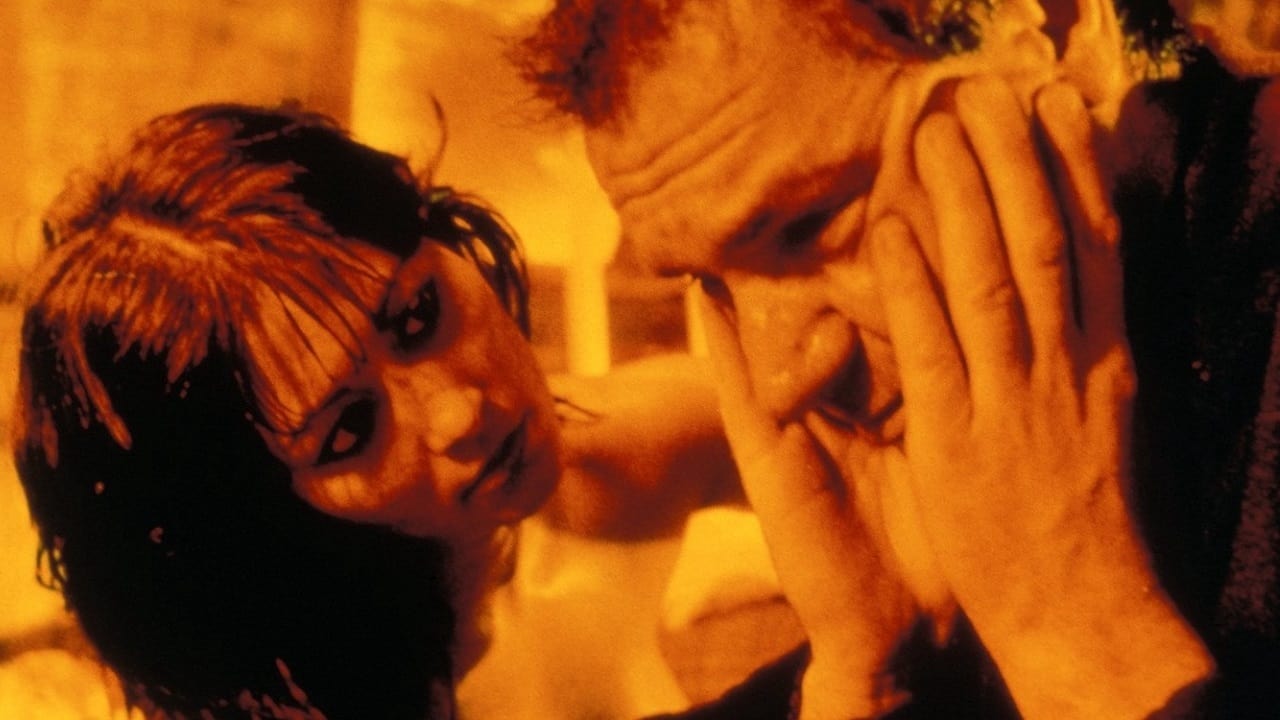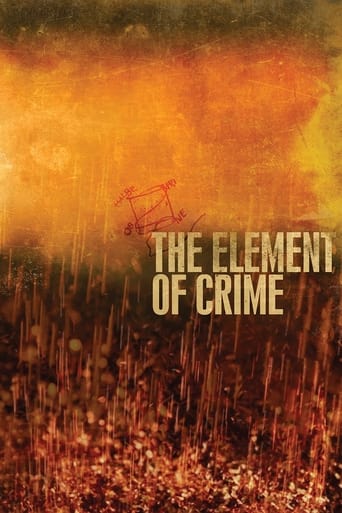

The greatest movie ever made..!
... View MoreVery interesting film. Was caught on the premise when seeing the trailer but unsure as to what the outcome would be for the showing. As it turns out, it was a very good film.
... View MoreI have absolutely never seen anything like this movie before. You have to see this movie.
... View MoreThe best films of this genre always show a path and provide a takeaway for being a better person.
... View MoreCaptivating, Mesmerizing, Hypnotic, Saturating Visuals Highlight this Debut Film from Director Von Trier. It's a Slow-Burn, Slow-Walk through an Ex-Cop's Hypnosis Projection to Solve a Serial Child-Murder Spree. The Lotto Girls Murder Case.Drawing from the Fringes of Cinema's Auteurs, LVT Crafts a Modern Dystonia Film-Noir that Slogs through the Earth's Elements (Water-Earth-Air-Fire) as the Sights Unfold and are Overlaid on the Viewer's Perception of Things and it's all Murky, Muddy, Smoky, and Smoldering with Rain, Ashes, and Ambiguity.Nothing is Clear. After All, it's a Hypnotic State as Fisher (Michael Elphick), the Detective, Voice Overs Occasionally to Relay what the Experience Uncovers and it's all Very Unpleasant.The Movie is Stunningly Framed, with an Enormous Amount of Attention to Detail, and the Cinematography and Lighting are Breathtaking. It Truly is Artistic. The Narrative is not that Engaging and the Dialog only Occasionally Ignites. The Crime Story Itself seems Anti-Climatic when it is Resolved.Overall, it is Experimental Movie-Making from a Rookie Director and Divides Audiences to Extremes. Worth a Watch for the Avant-garde and Cult Movie Fans.Mainstream Audience Acceptance will Not be Forthcoming. But for those that Prefer Their Film Going Experience to be on the Edge. Look No Further than the Filmography of Lars Von Trier's.
... View MoreThe first thing to say concerns the atmosphere and the style of the film. It is bleak. It is dark. The only color is a few dots of red in a lot of black. We are always or nearly always underground, in tunnels, galleries, with running water, in sewers or equivalent places. It is always the night with just some red lights or fire cutting the darkness. Then when we are inside some buildings they are just like outside, in ruins, dirty, bleak, dark, bad hotels when it is not some kind of indescribable refuge for human rats. It is supposed to be Europe, some reduce it to Germany, after WW2 and it is just a vast wasteland abandoned to its own irreversible decay.The characters are two let's say ex-cops. One, Osborne, has fallen out of grace though he is the head and thinker of the film, and the other one, Fischer, is an ex-cop who ran away from police work to find some peace in Cairo. One day he accepts to be hypnotized by a doctor to try to find some solution to a case that is haunting him. This explains the blurred and fuzzy images, the lack of details and the concentration on desolation and a few details here and there that are hardly visible and recognizable or identifiable. The only interest of the film, apart from this dystopian if not suicidal vision of Europe, is that Osborne advocates a special method to deal with serial killers. You have to enter their minds and penetrate their motivations. Why do they do this, why do they do it like that, and thus understand every single detail of the pattern of serial killers because they follow patterns. This is profiling as it was at the time devised by the FBI in Quantico. But the film shows that the cop runs a risk: he will little by little get into the tracks if not the footsteps of the killer in order to stop him by knowing what his next crime will be. He thus becomes the serial killer, and not only in a way, in reality. He has to stop and he did stop just in time. I am not sure that the fact the prostitute he uses all along has had a child by the killer Harry Grey adds anything to the plot except that Fischer is thus put some more in the position and even place of the killer to make us even doubt whether he is not the killer himself. That's the five seconds of tragedy, or rather melodrama. Of course we do not really know what is the past, what is the hypnosis or what is a new trip to Europe. Chronology is not important at all.A film that is difficult to really penetrate because of this somber darkness that wraps everything, every detail in some unbearable horror. We are like repulsed by it more than in anyway attracted to it. Horrified no, terrified no, grossed out for sure.Dr Jacques COULARDEAU
... View MoreOne detects the influence of many directors on the young Von Trier, many have already been mentioned (Tarkovsky, Hitchcock, Bergman, etc), but Tarkovsky looms the largest. The opening scene is a direct quote of 'Andrei Rublev', from there on in we are treated to ever increasing levels of Tarkovsky-esq rain, dripping faucets, people standing in water, until it becomes almost comical. The story is ostensibly your generic 'washed up cop pursuing a murder' mixed in with some hypnosis and color filters. The main character is apparently following a crime detection method outlined in a book (entitled 'Element of Crime', of course). This involves somehow 'becoming' the killer by recreating his steps, rather predictably, the line becomes blurred between cop and killer and then nothing seems to happen. The movie starts with good energy and atmosphere, but then fails to capitalize on the setup, scenes just seem to serve the purpose of allowing Lars to insert yet more Tarkovsky/noir references until it all starts to feel a little pointless. The movie then ambiguously grinds to a halt with no obvious conclusion (at least not one which was clear to me). One can't fault Von Trier's imagination, scenes often startle with their originality and composition, but it just starts to feel played out by the middle of the movie, the story is simply not strong enough to support the visuals. As a first movie, it's pretty damn good, but it just doesn't quite come off. Zentropa is a much better movie.
... View MoreLars Von Trier's feature début is a stylish, extremely bizarre and intriguing tapestry about an ex-cop (Michael Elphick) who obsessively pursues a serial killer. Playing with different film genres and supported by a fantastic production design, "The Element of Crime" was very different from what I expected, but not in a bad way. This is the first film in Lars' 'Europe trilogy', followed by "Epidemic" (1987) and "Zentropa" (1991). Influenced by Fritz Lang, Terry Gilliam and many others, the film also has a voice of its own (Von Trier's raging verve); I'd call it "The Silence of the Lambs" meets "Delicatessen", so you can have an idea of how bizarre it is. If that sounds interesting to you, you should check it; even if you're not into the likes of "Dogville" or "Breaking the Waves", you may still appreciate it. Interesting for Von Trier fans and admirers of puzzles alike. 8/10.
... View More